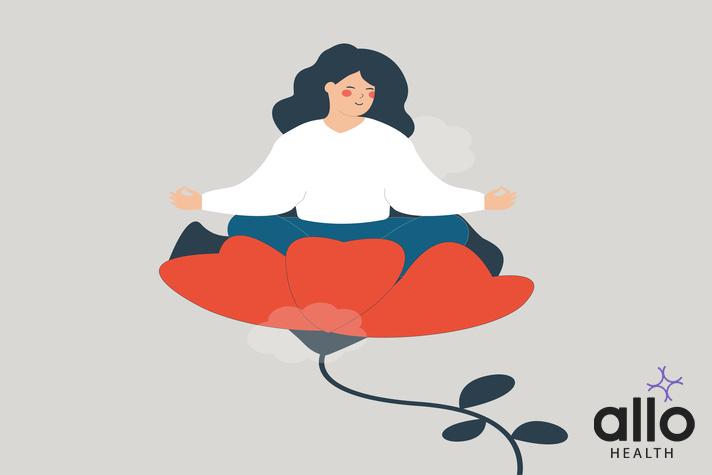At What Age Do Girls Start Masturbating

Allo Health is dedicated to personalized well-being, offering support and trusted information tailored to individual health goals. The platform emphasizes human-generated content, led by a distinguished medical team of experts, including physicians and sexual health specialists. Their commitment to credibility involves rigorous fact-checking, authoritative research, and continuous updates to ensure accurate, up-to-date information. Allo Health's unique approach goes beyond conventional platforms, providing expert-led insights and a continuous commitment to excellence, with user feedback playing a crucial role in shaping the platform's authoritative voice.

Dr. Warisha holds an MBBS degree from GMERS Medical College, Ahmedabad. She has an in depth experience on sexual and reproductive health and rights.
Why This Was Upated?
Our experts continually monitor the health and wellness space, and we update our articles when new information became available.
Updated on 23 June, 2024
- Article was updated as part of our commitment to diversity, equity, and inclusion.

"The following blog article provides general information and insights on various topics. However, it is important to note that the information presented is not intended as professional advice in any specific field or area. The content of this blog is for general educational and informational purposes only.
Book consultation
The content should not be interpreted as endorsement, recommendation, or guarantee of any product, service, or information mentioned. Readers are solely responsible for the decisions and actions they take based on the information provided in this blog. It is essential to exercise individual judgment, critical thinking, and personal responsibility when applying or implementing any information or suggestions discussed in the blog."
Masturbation is one of the most common human sexual behaviors, yet it remains shrouded in stigma and shame. For parents, talking to their daughters about masturbation can be a daunting task, especially when they don’t know where to start.
In this article, we’ll answer some of the most pressing questions parents might have, including at what age do girls start masturbating, why they do it, and how to create a safe and supportive environment for these discussions.
Understanding the Basics: What is Masturbation?
Masturbation is a normal and natural aspect of human sexuality and can be a way for females to explore their bodies, or learn about what feels good sexually. Masturbation is a completely normal behavior that does not cause any harm or pose any threat to physical or mental health.
It involves touching, rubbing, or stimulating the clitoris, vulva, vagina, or other erogenous zones to achieve sexual satisfaction. Women may use their fingers, hands, sex toys, or other objects for stimulation. It’s a personal choice and can be a healthy part of an individual’s sexual expression and self-discovery. Know more about the difference between clitoris and G-spot.
How Do Girls Masturbate
Each Individual has unique preferences when it comes to masturbation. The clitoris, located within a woman’s external sex organs (vulva), stands as the sole organ solely dedicated to sexual pleasure in the human body. It has a number of blood vessels and nerves that swell up on stimulation and produce tingly and pleasurable feelings upon stimulation.
Throughout masturbation, a woman might stimulate various areas of her vulva. This could involve the clitoris, inner or outer labia, the vaginal opening, the vagina itself (via fingering), and/or the anus. While some women enjoy direct clitoral stimulation, many prefer gentle rubbing around the clitoris as direct contact can be overly intense for them.
Why Do Girls Masturbate

- Girls may start masturbating as early as infancy when they discover the pleasure of touching their genitals, but it’s more commonly observed during puberty. Hormonal changes during puberty can increase sexual desires and curiosity, which may prompt girls to explore their bodies and their sexual feelings.
- Females also masturbate to release sexual tension, help alleviate menstrual cramps, sleep better, and improve mood.
- Masturbation can have positive effects on a girl’s sexual health. Regular masturbation can help girls become more comfortable with their bodies and their sexual desires, which can lead to better sexual experiences with partners in the future.
Know At What Age Do Girls Start Masturbating
- The onset of masturbation in girls can vary widely, and there’s no single “normal” age for girls to start masturbating.
- Typically, girls may start to explore their bodies and discover masturbation during childhood or adolescence as they become more aware of their sexuality and their bodies undergo hormonal changes.
- Many girls begin exploring their bodies and experiencing sexual arousal at different ages. Some may start experimenting with self-touch or masturbation during early childhood, while others might discover it during adolescence or later stages of puberty.
- It’s important to remember that there’s a wide range of individual experiences, and factors like cultural upbringing, personal beliefs, social environment, and emotional development can influence when girls begin to explore masturbation.
- The onset of masturbation in girls is a highly individual and natural process that can occur at various stages of development. There’s no specific “right” or “normal” age for girls to start masturbating, as each person’s journey of sexual exploration and self-discovery is unique.
What are the Benefits of Masturbation
Benefits of masturbation include:
- Firstly, it serves as a natural stress-relieving mechanism, fostering relaxation and easing tension by prompting the release of endorphins, the body’s natural mood lifters. This enhances emotional well-being, creating feelings of contentment and pleasure through the discharge of dopamine and oxytocin, recognized as the “feel-good” hormones.
- Engaging in self-stimulation before bedtime can aid in achieving deeper, more restful sleep, as the act induces relaxation, allowing some individuals to fall asleep quicker.
- For certain females, regular masturbation is believed to contribute to pelvic floor health by potentially strengthening pelvic muscles, which may reduce the likelihood of pelvic floor disorders in the future.
- Additionally, the release of endorphins during orgasm may provide temporary relief from menstrual cramps or headaches, offering a mild pain-alleviating effect.
- Furthermore, masturbation plays a role in sexual health maintenance by aiding in the preservation of vaginal lubrication. This can reduce discomfort during sexual activity and support overall healthy sexual function.
How to Talk to Your Daughter About Masturbation: Dos and Don’ts

Dos:
- Create a Safe and Supportive Environment: Foster an open and non-judgmental atmosphere where your daughter feels comfortable discussing sensitive topics without fear of shame or embarrassment.
- Initiate Age-Appropriate Conversations: Tailor discussions to her age and level of understanding. Use simple language and address questions based on her curiosity and developmental stage.
- Encourage Body Positivity: Promote a positive body image and reassure her that it’s okay to explore her body and experience pleasure in a safe and private manner.
- Educate on Privacy and Boundaries: Discuss the importance of privacy in exploring her body and setting boundaries, ensuring she understands appropriate times and places for personal exploration.
- Encourage Questions and Communication: Let her know she can ask questions and express concerns. Keep the dialogue open for ongoing discussions about sexuality and personal boundaries.
Don’ts:
- Don’t Shame or Scold: Avoid using negative language or shaming tactics. Criticizing or scolding may lead to feelings of guilt or secrecy.
- Avoid Overreacting: Stay calm and composed, even if the topic feels uncomfortable. Overreacting might discourage her from seeking guidance in the future.
- Don’t Force Discussions: Respect her boundaries. If she seems uncomfortable discussing the topic at the moment, allow her space and time to approach it on her own terms.
- Avoid TMI (Too Much Information): While being informative, avoid sharing excessive personal details or your own experiences that might make her uncomfortable.
- Don’t Use Negative Terminology: Refrain from using derogatory or negative terms to describe masturbation. Instead, use neutral or positive language to discuss the topic.
- Don’t Make Assumptions: Avoid assuming she engages in or does not engage in masturbation. Respect her privacy and individual journey regarding her sexuality.
Approaching the conversation with sensitivity, openness, and respect for her boundaries will foster trust and understanding, creating a healthy foundation for discussing sensitive topics related to sexuality.
Helping Your Daughter Develop Healthy Masturbation Habits
Encouraging healthy masturbation habits can help your daughter explore her sexuality in a safe and responsible way. Some tips for helping her develop healthy habits include:
- Encouraging privacy and boundaries: Encourage your daughter to explore her body in private and respect her boundaries if she’s ever uncomfortable or wants to stop.
- Discussing safer sex practices: If your daughter is sexually active or experimenting with new behaviors, encourage her to practice safer sex and reduce the risk of sexually transmitted infections (STIs) or unintended pregnancy.
- Encouraging communication: Encourage your daughter to talk to you or a trusted healthcare professional if she’s ever concerned about her sexual health.
- Emphasizing the normalcy of masturbation: Let your daughter know that masturbation is a normal and healthy behavior and that most people of all ages, genders, and backgrounds masturbate.
Some ways to incorporate discussions about female masturbation in sex education at home include:
- Using age-appropriate educational materials: Provide your daughter with books, videos, or other resources that are tailored to her age and level of sexual development.
- Being available for questions: Let your daughter know that you’re always available to answer questions or provide more information.
- Encouraging critical thinking: Encourage your daughter to question and evaluate sources of information for accuracy and credibility.
Potential Risks of Over-Masturbating: When to be Concerned
While masturbation is a normal and healthy part of human sexuality, excessive or compulsive masturbation may potentially lead to certain concerns or risks.
Read more about how much masturbation is healthy?
Here are some potential risks and when to be concerned:
Physical Risks:
- Genital Irritation or Trauma: Frequent or vigorous masturbation might lead to irritation, redness, or even minor trauma to the genitals due to friction or pressure.
- Temporary Sexual Dysfunction: Over-masturbation might cause temporary desensitization or difficulty achieving orgasm during partnered sexual activities.
- Fatigue and Physical Exhaustion: Excessive masturbation, particularly when it interferes with regular activities or sleep, can lead to fatigue and physical exhaustion.
Emotional and Psychological Risks:
- Guilt or Shame: Feelings of guilt, shame, or anxiety about masturbation might arise if an individual perceives it as wrong or excessive based on personal beliefs or societal norms.
- Compulsive Behavior: If masturbation becomes compulsive, interfering with daily life, relationships, or responsibilities, it could indicate underlying issues requiring attention.
Seeking Help:
If one experiences distressing physical symptoms, or emotional discomfort, or finds that excessive desire for masturbation interferes with daily life, seeking guidance from a healthcare professional, therapist, or counselor specialized in sexual health or mental well-being is advisable. These professionals can offer support, guidance, and strategies to address concerns related to masturbation habits and associated issues.
Conclusion
There is no desired or “right” age for females to start masturbating. It is a natural phenomenon that roughly begins at at age of puberty but can even occur before that in some females. It involves touching, rubbing, or stimulating the clitoris, vulva, vagina, or other erogenous zones to achieve sexual satisfaction.
It can have certain benefits like reducing period cramps, exploring sexual desires, and also word as the body’s natural mood lifters. There is no normal frequency for masturbation but looking for signs of over-masturbation is important, such as interference with regular activities or sleep, fatigue, and physical exhaustion. It’s a personal choice and can be a healthy part of an individual’s sexual expression and self-discovery.
Frequently Asked Questions (FAQs)
Q: At what age do females typically begin exploring masturbation?
Answer: Females might initiate self-exploration and masturbation at varying ages. Some might start during childhood, while others begin during adolescence or later stages of development. There isn’t a fixed age as it varies from individual to individual.
Q: How can parents identify signs that their daughter might be exploring masturbation?
Answer: Signs might include spending more time alone in private, increased interest in privacy during bathing or changing clothes, or a discovery of personal pleasure through self-stimulation.
Q: Is it normal for young girls to masturbate?
Answer: Yes, it’s considered a natural aspect of development for children, including girls, to explore their bodies. This exploration isn’t necessarily linked to sexual arousal in young children but stems from curiosity about their bodies.
Q: Can societal influences or exposure to media impact when females start exploring masturbation?
Answer: Exposure to sexual content or cultural attitudes might influence awareness of masturbation. However, individual curiosity and exploration often play a more significant role in determining when females might begin exploring self-pleasure.
Q: How should parents react if they discover their daughter is masturbating?
Answer: It’s important for parents to react calmly, without judgment, and create an open and supportive environment. Masturbation in children is typically a normal aspect of self-discovery, and discussions about privacy and boundaries are crucial.






































